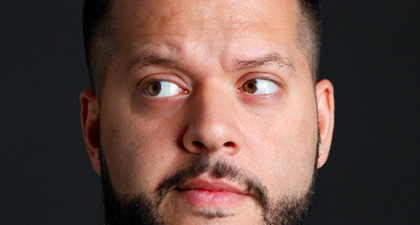Jesse Brown has always had a bit of a problem with authority.
Back when he was a youngster, he was politely asked to leave Leo Baeck Day School. As it happens, his aunt was the principal at the time.
At Northern Secondary School, he edited the school newspaper, Punch, and got into trouble when it published student report cards rating the teachers. The incident, which almost got him expelled, was picked up by the local media and Brown, all of 18, was asked by CBC to debate the school principal on the air.
It was his first experience with the media and the kind of controversy it can provoke. “I saw what it means to take a stand for free expression,” he said.
Today, at 37, he’s the successful entrepreneur behind the increasingly popular website Canadaland. An accomplished journalist, he’s broken some big stories in the 13 months since he launched the website/podcast. But the one that has really taken off and shows no signs of abating is the Jian Ghomeshi scandal at the CBC, which involve allegations of sexual harassment and violence against the radio host.
Ironically, Brown worked for a time at the CBC. He’s also written for Saturday Night magazine and has had a number of freelance jobs as well.
Last March he received an email from an unnamed woman relating her experiences while in Ghomeshi’s company. Further investigation showed there were other women with similar stories.
Brown felt the allegations were credible and newsworthy, but he was worried he didn’t have the financial clout and credibility to publish them on his own.
On the advice of lawyers, Brown took the story to the Toronto Star, where he could benefit from the paper’s editorial advice, legal support and credibility to give the story the weight it deserved.
The revelations have rocked the CBC and have led to the termination of the popular host of the radio show, Q.
One story has led to another, and Canadaland continues to break stories about the case. “I’ve never had a crazier time in my life,” Brown said.
Whether the Ghomeishi story is the most important one advanced by Canadaland is debatable, he acknowledges. Around the same time in October that the Ghomeishi story broke, he carried an interview with American journalist Glen Greenwald on the prevalence of government surveillance in Canada.
Other important items he’s covered include the speaker’s fee CBC anchorman Peter Mansbridge received from the Canadian Association of Petroleum Producers, payments to the CBC from Parks Canada, which suggests a quid pro quo, as well as a story of a senior editor at the Globe and Mail overruling the editorial board’s recommendation to endorse a minority Liberal government in Ontario and instead put its support behind Conservative Tim Hudak.
“I’m looking for interesting media stories that aren’t being reported,” he said.
A fan of the Daily Show; On the Media, a public affairs radio program on NPR; and Charlie Brooker’s Weekly Wipe, a BBC program, Brown realized there was nothing quite like these shows in Canada. He saw a niche and a place to start “a healthy conversation” about issues related to the media.
Apparently a lot of Canadians were looking for something just like that. Today, he boasts an audience of 10,000 listeners.
Brown learned, however, that attracting that kind of interest doesn’t necessarily translate into financial viability. Even with the support of an important corporate sponsor, he came to realize “you can’t make it on advertising alone.”
Brown made a pitch directly to his audience, asking each of his listeners to contribute $1 a month so that “Canadaland becomes an independent news org, a podcast network, and a daily news site.”
So far, 1,442 “Patrons,” responding through the Patreon website, have pledged more than $7,200 a month. The average donation is only $5.
Canadians want good journalism and they’re willing to pay for it, he said.
“It’s beyond my expectations,” Brown said. At $10,000 a month, he figures he can grow Canadaland into a small media organization.
As for his audience demographics, he’s found that it’s slanted to male over female, young over old and Ontario residents versus other Canadians. Some lean to the left, others to the right.
Brown himself defies categorization. On some issues, he considers himself a libertarian. At other times, his views line up with those who promote social justice.
“I think that with younger Canadians, partisanship is not an acceptable paradigm,” he said.
And as for his journalistic philosophy, he doesn’t promise his listeners that his perspective will be free of bias.
“I don’t believe in objective journalism,” he said. “I do believe in transparent journalism. Tell the people where you come from.”
He even finds a Jewish element in his approach. “There’s something Jewish about the sense of skepticism,” he believes, “not abiding the BS and asking difficult questions.”
No doubt the staff at Leo Baeck would be proud.
